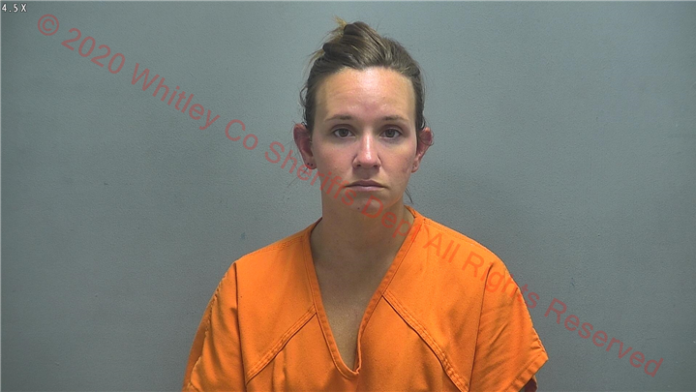The babysitter serving a 30-year prison sentence for the death of 11-month-old Emma Grace Leeman has filed an appeal requesting a new trial or a lesser sentence.
Courtney Kincaid, 30, was convicted by a jury July 31 in Whitley Circuit Court after they found her guilty of aggravated battery, a Level 1 felony; and neglect of a dependent resulting in death, a Level 1 felony.
Judge Matthew Rentschler sentenced Kincaid to 30 years in the Indiana Department of Corrections for each conviction, and had them run concurrently. Kincaid was further ordered to pay $11,447 in restitution to Nick and Sherry Leeman, of Pierceton, who are the parents of Emma Grace.
Kincaid has been an inmate at the Rockville Women’s Correctional Facility and has a projected release date of Jan. 28, 2043.
Kincaid babysat children in her Columbia City home, including Emma Grace. On April 12, 2018, Emma Grace suffered head trauma that caused extreme swelling on the brain. Surgery was required to alleviate that pressure, but Emma Grace did not survive. Fort Wayne Regional Medical Center Radiologist Dr. John Reed said “he considered the injuries caused to be more associated with a motor vehicle crash.”
Kincaid was the only adult present in the home at the time of the injuries. She has told investigators more than five stories of what happened to Emma Grace – none of which prosecutors nor Emma Grace’s family believe.
A five-day jury trial in Whitley Circuit Court – two years after Emma Grace’s death – featured testimony from doctors, experts, pathologists and an Indiana State Police detective who administered a lie detector exam on Kincaid, which she failed.
Kincaid’s attorneys – Zach and Brad Baber of Columbia City – painted their client to be a person of good character and as someone who simply spoke to the police without an attorney because she was trying to be helpful. The Babers have asserted throughout all court proceedings that Kincaid was tricked by detectives who used an interrogation technique that coerces false confessions.
On Monday, Kincaid, through her appeals attorney Cara Schaefer Wieneke with Wieneke Law Office in Brooklyn, Ind., filed an appeal requesting the Indiana Court of Appeals reverse her convictions and remand the case for a new trial. If that won’t be awarded, her lawyer asks the court to reduce Kincaid’s sentence to the minimum of 20 years or a revision of her current sentence to allow for a substantial portion of her time to be served on home detention.
In the appeal, Wieneke argues the court committed fundamental error when it denied Kincaid’s defense team the opportunity to present expert testimony from Alan Hirsch, a professor at Williams College in Massachusetts who writes scholarly opinions about false confessions and interrogation tactics used by law enforcement. Hirsch, at trial, spoke about the Reid Technique, a controversial techniques used by detectives that can result in false confessions. Wieneke argues that Hirsch ultimately concluded that, “in his expert opinion, the interrogations of Ms. Kincaid featured an aggressive application of the interrogation tactics known to contribute to false confessions.”
Wieneke writes that the trial court denied Kincaid the opportunity to present his full testimony and called the error “particularly egregious because the State was permitted to present testimony that the techniques used by the detectives in this case were not aggressive or relentless. The weight to be given to Courtney’s confession was really the only issued to be decided by the jury; the elements of the offenses otherwise were not in dispute. As Courtney testified, ‘I had to admit that I did lie during the investigation and I do have to own up to those stories. But I believe that it’s my words that have led me here today. I’m not here for my actions, I’m here because of my words.’”
Another argument made by Wieneke in the appeal is that Kincaid’s 30-year executed sentence was inappropriate in light of the nature of the offenses and her character.
“Regarding the nature of the offenses, Courtney does not dispute that the nature of her offenses, when the facts are viewed in the light most favorable to the jury’s verdicts, was disturbing,” Wieneke writes. “The jury’s verdicts reveal that they believed Courtney intentionally caused (Emma Grace’s) skull fracture and that Courtney’s actions after the injury seriously endangered (Emma Grace’s) life, ultimately leading to (Emma Grace’s) death. There was no evidence to suggest that Courtney intended to kill her. In her final confession, Courtney expressed feeling overwhelmed by the children in her care and, in a split second, lost control and reacted to (Emma Grace’s) needs in frustration.”
Wieneke argues that Kincaid’s character should be considered, including that nearly 50 people wrote letters on her behalf to the court during her sentencing and described her as “kind, caring, compassionate” among other nice things. Wieneke also reminds the appeals court that her client has had no prior criminal history and thus the 30-year sentence is too high.
“Courtney was determined to be at a low risk to reoffend, and those were circumstances that were unlikely to reoccur. Finally, Courtney expressed ‘survivor’s guilt’ from (Emma Grace’s) death and sough counseling for severe depression. In sum, the nature of the offenses was egregious, but Courtney’s character is unusually remarkable. It is rare, as the court noted, to encounter a person convicted of such serious offenses who has not had any prior involvement with the criminal justice system. It is also rare to encounter a defendant who has such an outpouring of support from family, friends and the community. Given her low risk to the safety of the community, a sentence of 30 years, all executed, was inappropriate.”





